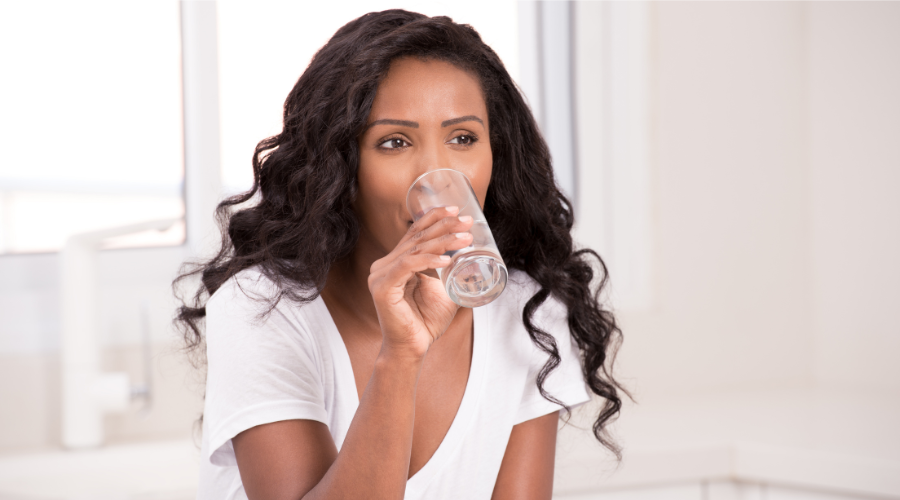Importance of staying hydrated during menopause

The human body consists of around 60% water, so it should be no surprise then that it is important to stay hydrated to maintain health and wellbeing. Staying hydrated during menopause is even more important and can help alleviate some menopausal symptoms.
Benefits of hydration during menopause
As we age the body naturally does not retain as much moisture as it used to. During menopause, it is even more important to ensure your water intake is enough to keep you hydrated. This is because menopausal symptoms such as hot flushes and night sweats can lead to additional water loss which requires increased fluid intake to stay hydrated.
Dehydration can cause a range of symptoms including, dizziness, headaches, dry skin, and feelings of fatigue. During menopause changing hormone levels can cause headaches which can be exacerbated if your water intake is not sufficient. The brain in particular needs a regular supply of water, and any slight dehydration can exacerbate feelings of brain fog, irritability and a feeling of ‘loss of words’. Many women also experience dry skin during menopause due to a reduction in the ability of the skin to retain water. Your skin cells are made up primarily of water so again staying hydrated can help to improve dry skin symptoms experienced during menopause.
5 ways to stay hydrated.
Here are 5 easy ways to ensure you stay hydrated.
1/ Drink plenty of fluids
It might seem obvious, but it is surprising how many people do not drink enough water each day to stay hydrated. The NHS Eatwell Guide recommends that you should aim to drink 6 to 8 cups or glasses of water a day. You may need to drink more than this if your body loses more water, for example, if you are in a hot environment or physically active.
2/ Do not wait until you feel thirsty
As we age, we lose our sense of thirst. This means waiting until you feel thirsty is not a good indication of when to have a drink. Start each day with a glass of water, replenishing your water reserves lost overnight. This also gets your metabolism up and running and gives you an energy boost. Throughout the day drink regularly even if you do not feel thirsty.
3/ Choose the right type of drinks
Drinking water is the most recommended form of hydration. Other fluids can count towards your daily intake. Fruit juices have additional benefits such as vitamins and minerals and can contribute to your daily fruit intake. Care should be taken regarding the sugar content of fruit drinks though. Coffee and tea also contribute towards your daily fluid intake. While caffeine can have a mild diuretic effect the water content is still beneficial. It is advisable to moderate caffeinated drinks and try to drink water where possible. Herbal teas such as chamomile, lemon and ginger, peppermint and liquorice can also boost hydration levels without the detrimental impact of caffeine, and have added benefits such as helping to aid digestion (peppermint) and contributing to a calming effect (chamomile).
4/ Eat fruit and vegetables
Our food can account for around 20% of your daily fluid intake. Eating fruits and vegetables will help you to meet your daily fluid intake levels. Fruits like watermelon, strawberries, and vegetables such as spinach, celery and cabbage have a high water content so they are good to incorporate into your diet to help you stay hydrated.
5/ Keep track of your fluid intake
The key thing is not to forget to stay hydrated throughout the day. In the busyness of day-to-day life, it is easy to get distracted and forget to drink regularly. Try and make it fun and use a mix of techniques to function as reminders. Set alarms or notifications on your smart devices as reminders throughout the day. Download free apps to monitor and record your water intake. Invest in a water bottle and take it with you wherever you go. If you are out socialising and drinking alcohol or even relaxing at home with a glass of wine, ensure that you always drink at least one glass of water for each alcoholic beverage, ideally alternating the two to be more aware of alcohol intake.
Hormone Health Associate and Registered Nutritional Therapist, Antonia de Gier explains why it is important to stay hydrated,
“I cannot stress enough the importance of drinking water and keeping hydrated at any stage of life, but particularly during the menopausal years, when we become much more aware of our systems and symptoms. Not only does water help to boost brain function and regulate temperature changes, it can also assist in constipation or irregular bowel movements. Water can help to pass fibre through the body and therefore pass softer stools, also aiding in eliminating any old unwanted circulating hormones, again crucial during a time of hormone imbalance and decline. I make a pot of hot water and add fresh slices of lemon and ginger root for a cleansing, calming start to each morning.”
Nutritional support at Hormone Health
At Hormone Health we understand that at any stage of life, your diet and lifestyle have a significant impact on your health and the way you feel. We offer a range of nutritional advice and treatment packages.
Registered Nutritional Therapist, Antonia de Gier, can provide help with all aspects, not just dietary, lifestyle and environmental areas, but understanding behaviours that may be stopping you from reaching your full potential.

Meet Antonia de Gier
Antonia de Gier is a Registered Nutritional Therapist, who has trained at the Institute for Optimum Nutrition (diploma) and the University of Middlesex (BSc Hons Nutritional Therapy) to understand the latest research in hormone health.
Arrange a complimentary 15-minute nutritional health discovery call with Antonia to find out how she can help you.